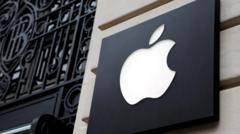A federal judge's findings against Apple for willfully disregarding court orders in favor of Epic Games could result in future legal troubles, as the company faces possible criminal contempt proceedings following allegations of deceitful practices.
Apple Faces Possible Criminal Contempt Charges After Perceived Violations of Court Order

Apple Faces Possible Criminal Contempt Charges After Perceived Violations of Court Order
A US judge has determined Apple knowingly breached an injunction linked to its App Store practices, potentially leading to criminal contempt investigations.
A US district judge has referred Apple Inc. for a potential criminal contempt investigation after concluding that the tech giant intentionally violated a previous injunction designed to curb its anticompetitive behavior related to the App Store. The judge, Yvonne Gonzalez Rogers, highlighted that a senior Apple executive "outright lied" under oath during proceedings connected to the case launched by Epic Games, the creator of Fortnite.
In her decision, issued this past Wednesday, Judge Gonzalez Rogers revealed her intention to forward the matter to the US Attorney for the Northern District of California to assess the adequacy of initiating criminal contempt proceedings against Apple. The injunction, originally aimed at promoting fair competition and enabling developers to use alternative payment options, has apparently been flouted by Apple.
In response to the ruling, Apple expressed strong disagreement, vowing to comply with the court's directives while also pursuing an appeal. The tensions between Epic Games and Apple date back to a case initiated by the video game developer in 2021, which argued vehemently for third-party payment routes to issue forth against Apple's standard up to 30% commission on app transactions.
This latest contempt ruling reinforces earlier findings that Apple improperly constrained developers by preventing them from providing links to alternative payment mechanisms. Notably, the judge's statement outlined a variety of Apple's measures aimed at thwarting competitive practices, including a new commission strategy that levied a 27% fee on off-app purchases.
Furthermore, Judge Gonzalez Rogers cited internal documents indicating Apple's awareness of its actions, suggesting that Apple executives chose strategies designed to preserve an unchallenged monopoly in the App Store domain. CEO Tim Cook faced criticism for allegedly ignoring advice advocating for compliance with the injunction.
In a surprising development, Epic Games’ founder and CEO Tim Sweeney took to social media to announce plans for Fortnite's revival in the US iOS App Store, alongside an offer to resolve ongoing disputes if Apple expands the current court-backed framework to a global scale. In his statements, Sweeney declared future game development transactions would be free from Apple’s commission, following the company's legal challenges in both the US and Europe under regulations like the Digital Markets Act.




















